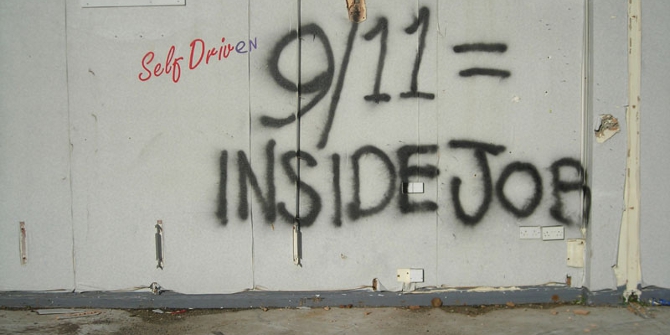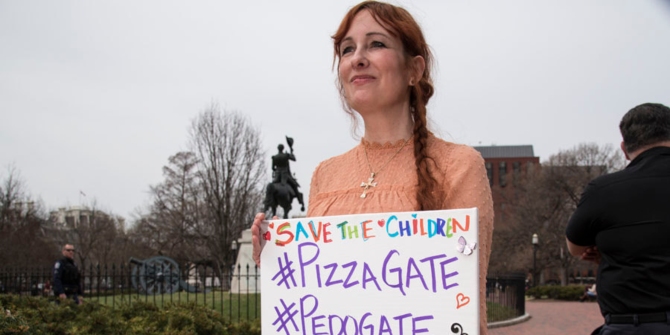 In the years since 9/11, conspiracy theories have regained prominence in much of the American public’s imagination. But why do many so readily embrace certain conspiracy theories, often in the face of a profound lack of evidence? Joseph E. Uscinski argues that in order for a person to believe in a conspiracy theory, that person must first have a worldview that encompasses conspiratorial thinking, and second, the theory must be in accord with their other predispositions.
In the years since 9/11, conspiracy theories have regained prominence in much of the American public’s imagination. But why do many so readily embrace certain conspiracy theories, often in the face of a profound lack of evidence? Joseph E. Uscinski argues that in order for a person to believe in a conspiracy theory, that person must first have a worldview that encompasses conspiratorial thinking, and second, the theory must be in accord with their other predispositions.
Conspiracy theories have flourished in the United States since before its founding. Early colonists feared the witches who plotted with Satan. Later, their progeny was concerned with the English King, the Illuminati, Freemasons, communists, Mormons, Muslims, and every other group that could potentially conspire. Today, conspiratorial accusations are thrown at powerful political actors like the president, government agencies, and Congress. Is Obama an illegal usurper from Indonesia? Did Bush and Cheney blow up the Twin Towers and the Pentagon to start a “global war on terror”? Are world leader descendants of an ancient line of reptilian shape-shifters?
Sometimes, conspiracy theories turn out to be true. Those in the early 1970s that thought Richard Nixon was conspiring against the American people turned out to be correct. Nixon did subvert the Constitution and did attempt to cover up those crimes. Evidence was gathered, hearings were held, admissions were made, and people went to jail. But, in many other instances, the evidence in favor of conspiracy remains far more wanting.
However, a lack of evidence does not dissuade the millions of Americans who believe in one conspiracy theory or another. Given recent polling, it is safe to say that nearly everyone in the US believes in at least one conspiracy theory; most people believe in many. Why do people believe in conspiracy theories when the evidence is often flimsy? Or more importantly, why do some people believe in only a few conspiracy theories while others believe in many?

Scholars have struggled with these questions for a long time. As I argued on the EUROPP blog, there are many popular explanations for belief in conspiracy theories that can be put to rest, or are at least in need of revision and qualification. For example, mental illness is not a determinate of, or prerequisite for, holding conspiratorial beliefs (if it was, nearly all Americans would be mentally ill). Everything and the kitchen sink has been blamed for conspiracy theories; however, most of these explanations hold only as much water as conspiracy theories themselves. There is, however, a recently discovered and parsimonious explanation for conspiratorial beliefs that explains the between-person variation in the number of conspiracy theories citizens believe in.
As argued by both psychologists and political scientists, there seems to be a worldview (or ideology) that drives people to see the world in terms of conspiracies. It can be thought of as a bias against powerful actors. Citizens holding such a worldview strongly are likely to see conspiracies lurking everywhere; citizens who don’t subscribe to this worldview are far less likely to see conspiracies afoot. Most people are somewhere in between. I term this worldview the “Conspiracy Dimension.”
Much like the typical left-right political ideology often discussed in the U.S., this conspiracy ideology determines how people interpret new information, view leaders and authorities, and understand the world more generally. Interestingly, as social scientists and polls have shown, this dimension of thought exists separately from left-right and Republican-Democrat dimensions. (In other words, people on both sides of the political divide are equally likely to see conspiracies.)
Where does this worldview come from? While research is still in the early stages, it is likely that socialization plays a large role. Just like party affiliation and ideology stem from early childhood socialization (parents, education, etc.). Most people in the U.S. are socialized in such a way as to make them skeptical of many conspiracy theories; they are generally taught that authority figures are benevolent. However, some people are exposed to alternative socialization patterns, and thus are socialized to be more accepting of conspiracy theories accusing powerful actors of secretly harming an unsuspecting public. For example, many African-Americans are socialized to be more skeptical of authorities given the past abuses they have faced. Gen Xer’s (American born between 1965 and 1980) were socialized in the shadow of Watergate, Vietnam, and a series of high-profile assignations; this group seems to be more disposed towards conspiratorial thinking than generations that either came before them or followed. In short, people are raised to have a certain level of predisposition towards seeing conspiracies.
With this said, the conspiracy dimension is not the only dimension of ideology that affect which opinions people will or will not hold. Let’s take partisanship for example. Republicans highly predisposed to see conspiracies will likely believe Obama was born in Indonesia, but will be less likely to believe that Bush and Cheney blew up the Twin Towers. On the other side, we find that Democrats high on the conspiracy dimension will likely believe that Bush and Cheney were behind 9/11; but that Obama is as American as apple pie. Democrats and Republicans with very low predispositions toward conspiratorial thinking will likely not buy into either the Birther or Truther theories. People’s conspiratorial beliefs need to be congruent with their other attitudes – particularly their political attitudes.
Is this good or bad? One thing that this tells us about conspiratorial beliefs is that their levels should be stable over time. This is first because those low on the conspiracy dimension will not buy into conspiracy theories very often. Second, since conspiratorial beliefs need to be attitude congruent in most instances, only about a quarter to a third of the population will believe in even the most high profile conspiracy theories. Birther and Truther polls, for example, show that these conspiracy theories at best convinced 25 -30% of the population. The good part of this, is that it is very difficult (even though it has happened) for conspiratorial thinking to overtake the country and influence policy in a deleterious way.
Please read our comments policy before commenting.
Note: This article gives the views of the author, and not the position of USApp– American Politics and Policy, nor of the London School of Economics.
Shortened URL for this post: http://bit.ly/1fQEeDX
_________________________________
 Joseph E. Uscinski – University of Miami
Joseph E. Uscinski – University of Miami
Joe Uscinski is assistant professor of political science at University of Miami in Coral Gables, Florida. He is currently completing a book on conspiratorial beliefs for Oxford University Press with coauthor Joseph M. Parent.







3 Comments